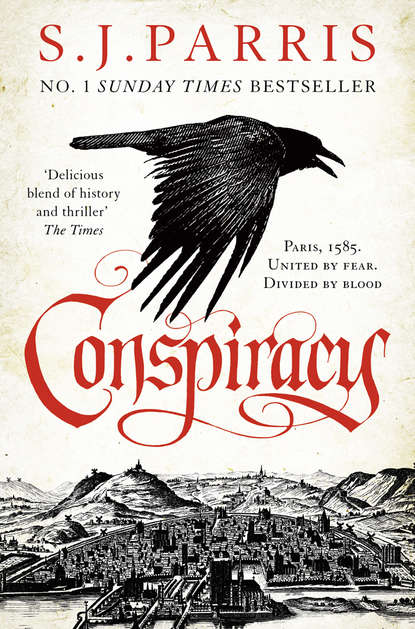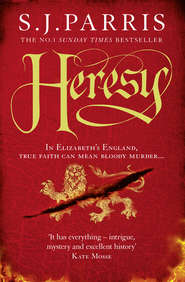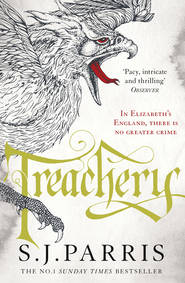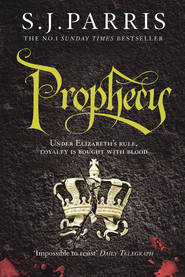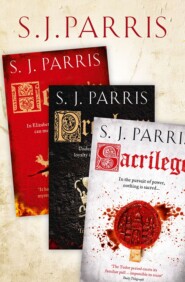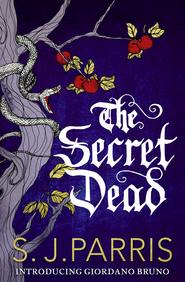По всем вопросам обращайтесь на: info@litportal.ru
(©) 2003-2024.
✖
Conspiracy
Автор
Год написания книги
2019
Настройки чтения
Размер шрифта
Высота строк
Поля
The mist had thickened – or perhaps it was just that the light was already failing. It must be close to four in the afternoon. If I was right, and the killer would wait until the abbey was asleep, I could be standing behind those crates for six hours or more. I had survived worse, I told myself. By the corner of the outbuilding, I unlaced my breeches and relieved myself in a steaming stream on the grass, trying not to think that it might be my last opportunity for some time, while Cotin kept his eyes trained on the trees ahead. I nodded to him when I was ready, and he waited until I had taken my place again in the recess behind the crates.
‘I’ll stay in the library tonight after the lights go out,’ he said. I could just make out the shape of him through the gap between the stacks. ‘I have special permission to work there if I am unable to sleep – they will see nothing unusual in that. If you have any trouble, you will know where to find me. Pray God you’ll have no need. Get what you came for and leave quietly. I will find you at the Swan tomorrow after dinner to fetch the keys – best you stay clear of this place for a while. And take care of yourself,’ he added over his shoulder, his voice gruff to disguise his concern.
I smiled to myself in the shadows. The door closed behind him, leaving me in darkness as the lock clicked into place. I fidgeted until I found a position that allowed me to lean my weight against the wall and settled back to wait, reminding myself that the discomfort would be worth it, that in a matter of hours I would deliver both murderer and evidence into the King’s hands. After that, how they chose to persuade the man to implicate the Duke of Guise would be Henri’s concern. I allowed myself to dream a little of how the King might choose to reward me for my service.
Perhaps if I had been less cocksure about my ability to apprehend the killer single-handed, so that I could prove myself to the King and take the credit, the night would have unfolded differently and another death might have been avoided. But I run ahead of my story, and it does no good to speculate on what might have been.
FIVE (#ua64309e4-61c3-5734-9347-6c90532311a5)
Muffled by fog and distance, the church bells of Saint-Victor tolled the passing hours, summoning the friars to observe the holy offices first of Vespers, then of Compline. The temperature dropped as darkness enfolded the abbey; in my coffin-like space behind the crates, my limbs grew so chilled I felt I was being paralysed from the inside out, my feet so frozen that hot currents of pain began to needle through them and up my legs. My back developed a fierce, dull ache; from time to time I dared slide out and stretch or stamp to restore some blood to my extremities. Despite the discomfort, I must have dozed, waking with a start each time I began to tilt sideways, wrenched from monstrous dreams of being buried alive. I wished I had asked Cotin to leave his lantern; I could have passed the hours looking through the boxes of forgotten manuscripts. But that was folly; I would not have had time to conceal myself if the door opened, and the smell of candle smoke would give me away. Instead I remained hidden in the darkness, listening to the squeaks and pattering of rats and the slow creak of old timbers, reviewing what I thought I knew.
Paul Lefèvre had intimated to me during our conversation in the confessional that he believed the King would not hold power for much longer. Though he had quickly tried to deny that he meant anything specific, it seemed likely that he had some concrete intelligence of a planned coup by the Duke of Guise and the Catholic League. But a priest like Paul would be small fry to Guise; useful while he could be persuaded to attack King Henri from his pulpit, but hardly someone to whom Guise would have confided plans for an act of treason. So Paul must have come by that knowledge another way; the burned scraps of letter in his hearth suggested that he had heard something in the course of a confession that had disturbed him so greatly he had considered breaking the holy seal of the confessional in order to warn the King. Some terrible harm planned by someone or something known as ‘Circe’. Whatever he had learned had troubled him so much that it had been the last thought to pass from his shattered brain to his lips as the life bled out of him. But here my theory foundered on a lack of certainty. There was no way of knowing whether Paul had sent a copy of that letter to the King, or whether he had changed his mind but someone had still felt he needed to be silenced.
The nature of the letter also puzzled me. Paul was a zealous supporter of the Catholic League; you would suppose that he would support any plot to topple the degenerate King and replace him with a righteous Catholic. What could be so terrible about the harm intended by ‘Circe’ that it could have induced the fervent Paul to consider betraying not only the sacrament of confession but his loyalty to the entire cause of the League? And who could have confessed such a conspiracy to him? I did not have the answers to these questions. I could only guess that, somehow, the Duke of Guise had anticipated betrayal and taken measures that he hoped would prevent it. But if so, that meant he must also know about the confession; presumably that person too would have to be silenced. Perhaps the killer would be able to shed more light on the plot once he was in the custody of the royal guard.
I was jolted from my theorising by the sound of a key in the lock. Wedged tight into the recess, I leaned across to make sure I could see through the narrow gap between the two stacks of boxes. Ignoring the pain in all my joints, I held myself still, terrified that the slightest sound would give me away and ruin my advantage. Despite what I had promised Cotin, I had no intention of allowing the killer to leave and hide his evidence. I was confident that, with surprise on my side and the help of a weapon, I could easily overcome him and force him at knifepoint to the gate, where the King’s soldiers would be waiting.
The door creaked open and a faint circle of light appeared; behind it, the outline of a figure, the cowl of his habit pulled up over his head. I heard the door click shut and the light brightened; I realised he had draped the lantern with a cloth to dim it on his way through the grounds. I held my breath, every fibre tensed. He crossed immediately to the boxes of books, set down his light and crouched to pull away the first crate. Silently, I eased out from my hiding place and drew my knife. The light from his lantern puddled on the floor; I caught a glimpse of his profile as he straightened, clasping the bundle with the statue to his breast with both hands like a Madonna holding an infant. I stepped forward; the movement startled him and he whipped around to face me, frozen with surprise.
‘Keep quiet, don’t move, and you won’t come to harm,’ I said, holding the point of the knife towards him. ‘I need you to come with me. Bring that with you.’
His face was still hidden in shadow, but I saw his eyes flick down to the statue, as if he had forgotten he was holding it. In an instant he seemed to recover his power of thought; he leaned back and, with considerable force, hurled the statue at me so that it struck me in the chin. I staggered backwards, touching my fingertips to my face, and in that unguarded moment he swung a punch that connected with the left side of my jaw. I dropped the knife; my mouth filled with blood as I struggled to recover my balance, but he reached out and pulled at the stack of crates beside us so that it toppled forwards. I managed to jump back as boxes of stone, glass and metal crashed across the floor, trapping me in the corner. I was fortunate that no flying debris struck me, but by the time I had clambered over the heap, he had already grabbed the lantern and plunged me into darkness as he closed the door behind him.
Cursing, I stumbled blindly across the room, spitting blood, relieved to find that he had not locked me in. Outside the mist was so thick now that I could not see more than four or five feet in front of me, but the lantern was just visible as a pinprick of fuzzy light between the bent shapes of trees ahead. I lurched after it, tripping on clumps of grass, branches clawing at my clothes, damp skeins of cobweb clinging to my face as trunks loomed out of nowhere and the light bobbed and grew fainter. Moonlight barely silvered the layers of vapour that hung heavy as smoke in the air. After a few paces I could no longer see the lantern at all. I thought I heard a low laugh from just behind my left shoulder, though it might as easily have been a magpie. I realised he had led me into the orchard deliberately to confuse me. There was no sound now but the stillness of the night and my own blood thudding in my chest. Turning again to what I believed was the direction of the path, I moved with caution, but before I found the edge of the trees I glimpsed the light again, jouncing up and down a few yards ahead. I ran towards it, only to see it disappear as I heard the sound of a gate slamming and the key turning in the lock.
‘Merda,’ I muttered. A few feet further on I found the path leading to the door in the wall; my quarry had slipped out while I was stumbling among the trees. I hesitated, trying to decide my best course. I had Cotin’s key; I could pursue him, but he might have hidden himself along the river track with the idea of ambushing me if I followed. He had already shown himself unafraid to kill a man on that path; I did not want to go the same way, and I was unarmed now. Besides, I thought, brightening – if all had gone smoothly, he would have run straight into the arms of the King’s soldiers. I hoped they would have the wit to hold him until I caught up with them. But there was still the matter of evidence; while he was away from the abbey, this was my chance to see if there was anything more than the cloak and statue that would serve to condemn him beyond doubt. Perhaps he had kept some correspondence hidden in his cell that would make explicit who had set him on to kill Paul – any such letter would be a thousand times more valuable than a bloodied statue. It was worth a try. I ran my fingers gingerly over my swollen lip; though I had still not had a clear view of his face, I could be fairly sure that punch was not thrown by a man with a crippled right hand. If Cotin was right, there was only one other friar with a key to the storeroom. At least that meant I had an idea of where to start.
I turned my steps away from the gate and followed the path back to the outbuilding. Feeling along the shelf behind the door where Cotin had found the lantern, my fingers closed over a stub of candle. I drew my tinder-box from the pouch at my belt and fumbled with frozen and trembling fingers to strike a spark from it. The room was a chaos of broken stone, metal and glass, strewn over the floor where he had pulled the crates down to slow me. Scrabbling one-handed while I tried to hold up the feeble light, I found my knife, then unearthed the statue, still tangled in its cloak, and bundled it under my arm.
The damp air snuffed my candle as soon as I stepped outside. After a couple of attempts to relight it I was forced to concede that I did not have the time to lose; I would have to rely on my sense of direction. If the King’s guards had not stopped my attacker, there was always the chance that he would run around the perimeter of the abbey wall and try to enter another way, but the main gate would be barred at this hour and surely he would not want to wake the gatekeeper and explain himself. My guess was that he would wait and return eventually through the back wall in search of the statue. I had no idea what time it might be by now, but I must not be found sneaking around the abbey when the friars were awakened for the office of Matins at two o’clock. I could not afford to end up wandering lost in the mist. From the storehouse I set out through the trees away from the wall that separated the abbey grounds from the river path and tried to steer myself in a straight line. As a novice, I had been taught to recite certain Psalms as a means of measuring time without the need for clocks or church bells, and though I no longer spoke them in worship, I still had them all by rote, and they proved useful when I needed to mark the passing time. So it was that, after around ten minutes of determined walking, one step after another, into the white blankness, I saw the bulk of the abbey church against the sky a hundred yards ahead. Relieved, I quickened my steps towards it and the cloisters that lay beyond; in my haste I collided with a tall figure who reared up out of the mist, arms outstretched over me. I stifled a cry and jumped back, dropping the statue and grabbing for my knife as my heart hammered at my ribs, but my assailant did not move. After a moment, my shoulders slackened and I let out a panicked laugh at my own folly. I had run into a stone angel, wings spread, empty eyes raised to heaven. Taking another step back I almost fell over an object at knee height; I turned to find a moss-covered cross and realised I had wandered into the abbey cemetery. Picking my way through the graves, I found a path that I could follow as far as the church. There had been plenty among my brothers at San Domenico who would have been gibbering prayers to the Virgin and all the saints had they found themselves alone in a mist-shrouded graveyard at this hour, but I had never shared that monkish fear of the unquiet dead. It was only the living who would creep up on silent feet and put a blade in your neck.
There was no trace of light from the windows of the library, but the door was unlocked, so I slipped in as quietly as I could and lit my candle. Shadows leapt back and I felt a pulse of affection at the sight that greeted me; Cotin had fallen asleep at his desk with his head on an open book, resting on the crook of his arm, his lamp burned down beside him. I crouched and shook him by the shoulder.
‘Wha—?’ He jerked awake, turning unfocused eyes on me. I motioned for him to be quiet.
‘Where’s Albaric’s cell?’
‘Eh? Dear Lord, what happened to your face?’
‘Not important. I need to look in Albaric’s cell. You have to show me which one it is.’
He levered himself up, wincing at the complaints of his joints. ‘I had hoped not to see you again tonight.’ He eased his neck from side to side.
‘My apologies. We need to hurry.’
‘Why, what hour is it?’
‘No idea. But he could return any moment.’
‘It is him, then? You are sure?’
‘No. But it seems the most likely possibility. He had a key and there was nothing wrong with his hand.’ I ran my tongue along my swollen lip and tasted blood. ‘That’s why I want to see his cell.’
Cotin eyed the statue under my arm, muttered a half-hearted protest and motioned for me to follow. At the door, he blew out my candle, in case the light gave us away to the night watch, and we both pulled our hoods around our faces. Keeping to the shadows against the walls, he led me around the arcades of the cloister and into the courtyard behind. The friars’ dormitory, directly ahead, was a long building of unadorned stone with rows of individual cells on two storeys facing one another across a wide corridor. I followed him up the first flight of stairs to the upper level. From the recess of the staircase, he pointed to the left-hand row of doors and held up four fingers. My eyes had begun to grow accustomed to the dark; I handed him the statue and left him hidden on the stairs while I crept along until I came to the fourth door. I glanced about me to either side before putting my hand to the latch. The atmosphere was oddly silent here, not even the usual snores or grunts you might expect from a house of sleeping men. It was as if every friar were holding his breath in anticipation. All the doors I could see appeared to be closed fast, but in my experience that did not necessarily mean no one was looking.
I let myself into Albaric’s room without a sound, keeping my hood up, and struck my tinder-box until the damp candle caught flame. By its light I saw a plain table against the wall by the door, with a large leather-bound book lying on it. That would be a place to start, at least; letters might be hidden between pages or inside bindings. I picked up the book, trying to hold the candle steady, but the volume was too large to lift with one hand, and as I was shaking it by the spine it slipped from my grasp and landed with a loud slap on the table. I froze, every muscle taut and trembling, eyes fixed on the door as I waited to see if the noise had disturbed anyone.
‘What in Jesu’s name—?’ said a voice behind me.
I whirled around with a gasp, to see Frère Albaric sitting up on the mattress against the far wall, tangled in a woollen blanket. He stared at me, equally amazed, his eyes dazed and puffy with sleep. His hair stood up in tufts around his tonsure; one cheek was marked with a crease from his sheet and I could see that he was wearing a linen nightshift. His face bore the naked vulnerability that comes from being jolted out of deep sleep. I had been so convinced that he must have been the man in the storeroom I had no more than glanced at the bed to register a heap of blankets. I recovered my presence of mind before he did and blew out the candle as I slipped back into the corridor, hoping he had not had a chance to see my face.
A hand shot out from the darkness and grabbed my arm as I emerged; I jumped again, but it was Cotin, pressed up against the wall.
‘Frère Joseph is not in his cell,’ he whispered, pulling me by the sleeve and pointing me to a door on the opposite side, towards the far end. I scuttled along, hoping that Albaric would conclude he had imagined a figure from his nightmares and fall back to sleep without feeling the need to raise an alarm.
I eased the door of Joseph’s cell shut behind me and leaned against it, trying to slow my breathing. When I had managed to light the candle again, I saw that the almoner’s room was laid out much as Albaric’s, though the few furnishings were more obviously expensive: a mattress on a wooden pallet under a small arched window, set high in the wall opposite the door; on the right-hand side, a table and on the left, a wooden trunk. At least this time the bed was empty; from the tumbled sheets it looked as if Joseph had left in a hurry. The table was also bare, save for a branched silver candlestick, but to my relief, the chest was not padlocked. I opened the lid and began to pull out whatever I could find: good quality linen undershirts; a pair of leather shoes; a rosary of amber beads, smooth as glass; a tortoiseshell comb … but nothing more. Not in a trunk open to anyone; I should have realised. I cast around to see where else he might have hidden personal effects. The room held no other furniture, no cupboards, no drawers. Where had I squirrelled away the writings I wanted to keep from prying eyes when I was a friar? My eyes lighted on the mattress.
I fixed my candle into the silver holder on the table and set it down by the bed so that I could grope along the underside of the mattress until I felt a split in the seam, just large enough to slip a hand inside; through the lumps of horsehair my scrabbling fingers closed around a sheaf of papers. I drew them out and untied the ribbon binding them as I brought them closer to the light. The topmost sheet was instantly recognisable; another crude sketch of King Henri mincing in women’s clothes while two sly-looking young men with lascivious pouts wrapped their fists around the sceptre he held erect in his lap, above a set of satirical verses about the Queen Mother’s desperate recourse to witchcraft to secure a Valois heir. The paper beneath was more unusual: it showed a series of drawings depicting a variety of imaginative forms of torture and execution, while a queen looked on, the name ‘Elizabeth’ emblazoned above her head. The text was an impassioned plea, shorn of all ribald jokes, urging the people of France to consider the plight of their fellow Catholics in England, and to rise up and exterminate heresy before they too suffered the same fate at the hands of the Protestants. The writer ended his polemic by calling on true Catholics to finish the work begun on the glorious night of Saint Bartholomew’s – an extraordinary exhortation for which he would certainly be executed, if his authorship could be proved. The style – and I could almost swear the handwriting – were identical to the ones I had found in Paul’s room. That, at least, was evidence of a connection between Frère Joseph and the murdered priest.
But there was another paper beneath, of better quality and written in a different hand. As I read, I felt my eyes widen.
Your fingerprints your mouth your tongue burn my skin long after you are gone. Only you know the secret places of my body, the way I ache for you, in the knowledge I should not. Yet for all the judgement and scorn arrayed against us, for all the punishment that might befall us if it were known, I would not have given up one single hour in your embrace. You consume me. My desire wills me to you like a hawk towards home.
Followed by more in this vein, though it was neither signed nor dated; hot words for a friar who had taken a vow of celibacy. Joseph was running a great risk in keeping such an inflammatory letter, but perhaps his high birth gave him immunity from routine searches. I held the paper up to my face and sniffed it; faint traces of perfume lingered behind the smell of stale horsehair. The writing was distinctive, the letters embellished with elaborate flourishes; an educated hand, but belonging to someone with a taste for ostentation. I decided to keep the note; Joseph de Chartres may be well connected, but proof of a forbidden love affair might make him vulnerable. I was not sure how much could be achieved without a signature to the letter, or any means of identifying his correspondent, but it would surely make him nervous to suspect that someone else had it in their possession, and that might give me leverage.
I tucked the papers carefully into the secret pocket sewn into the lining of my doublet – an alteration I had had made to all my clothes when I lived in London, for just such a purpose. Reaching again into the mattress to check I had not missed anything, I rummaged around until my fingertips touched another object; this time a leather purse, tied with a drawstring. I opened it and tipped the contents into my palm: two gold écus and a torn strip of paper, on which was scribbled, in the same hand as the pamphlets, Brinkley, 28 11 4h.
Was it a code? Who or what was Brinkley? It was an English name, if I was not mistaken. Many of the émigrés who had fled to Paris rather than renounce their faith under Elizabeth had established connections with the Catholic League; if Joseph de Chartres was involved in distributing propaganda against the King, he might also be collaborating with the English Catholics – the anti-Elizabeth pamphlet among his papers suggested as much. Or perhaps Brinkley was a reference to the mistress, and the money was for her. As I stared at them, it struck me that perhaps it was not a cipher at all, but a far more obvious explanation – 4h could mean simply a time, quatre heures, in which case the other numbers might be the date. The 28th of November was tomorrow. A rendezvous, then? Even if my guess were correct, I had no way of knowing where or with whom, but at least it was one more thin thread I could follow, now that I was certain that Joseph must be Paul Lefèvre’s killer. I touched a thumb to my bruised mouth. Evidently he had exaggerated the limitations of his crippled hand.
I was crouching to return the money to its hiding place when the cell door juddered open and light flooded the walls. I whipped around, startled; a figure filled the doorway, lamp held aloft. He appeared to be fully dressed, despite the hour.
‘Put down the weapon,’ he said, in a voice accustomed to giving orders.
I stood and held out my hands, palms up, to show I was not armed. He eyed the purse.
‘The one at your belt,’ he said, with a touch more steel. He was a solid man, tall and broad, nearing sixty but still possessed of a vigorous energy apparent in his florid cheeks and quick, sharp eyes under bristling brows. His abbot’s robes were trimmed with fox-fur and patterned in gold thread that winked in the light; a jewelled crucifix hung from his neck, so large it almost reached his belt and would have made a lesser man stoop. ‘Let us see, now,’ he continued, as I unstrapped my knife and dropped it to the floor, ‘carrying a weapon inside the abbey precincts – that is an offence in itself. Unlawful intrusion, theft, violent assault—’ he gestured to the blood on my lip. ‘Quite a list of charges to be going on with.’
‘It was I who was assaulted,’ I said.
He raised an eyebrow. I realised I would do better to affect a degree of humility.
‘Father Abbot – I can see how this must look. But I can explain. If you send someone to look outside the gate, you will find soldiers from the King’s personal guard who will vouch for me. My name is—’
‘I know exactly who you are, Doctor Bruno,’ the Abbé said. His look suggested this knowledge was not going to work in my favour. ‘As for the soldiers – there are armed guards here, but not, I fear, the ones you requested in this letter.’ He flicked his wrist up to show a piece of paper held between his first and second finger. My heart dropped to my stomach. ‘Do you imagine I allow messages in and out of this abbey without knowing what they contain? Especially ones addressed to the Louvre. Cotin should have known better. But perhaps he stood to gain as your accomplice.’
‘Father Abbot, you must listen. I believe you have a murderer in your abbey.’ I looked him in the eye and spoke solemnly. If I betrayed a hint of alarm, I would be giving him the confirmation he wanted.
‘I have a thief in my abbey, that much seems beyond doubt.’ He sniffed.





